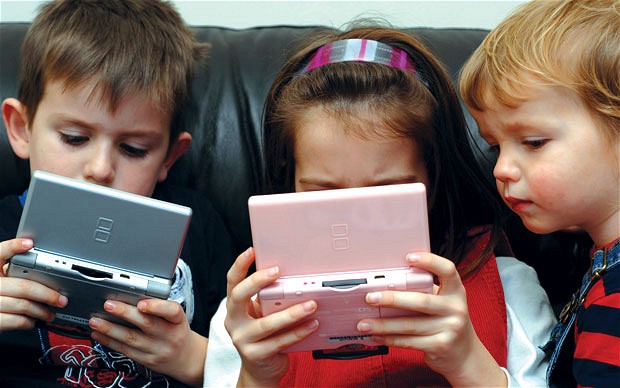Those Kids and Their Darn Gadgets
I consistently hear these sorts of complaints a lot from parents, grandparents, and random adults on Facebook bemoaning the decline of a sort of basic decency among today’s youth.
- “Kids today are addicted to being on their damn electronic devices.”
- “Kids don’t even learn proper spelling or grammar with their stupid text speak.”
- “Video games and smartphones are like crack for young minds.”
- “Kids today aren’t learning necessary social skills since they won’t pull their noses out of their devices.”

Most are said by folks who are very well-intentioned, really caring for the kids and wishing the best for them. But I am so sick of hearing this kind of blind and backward obliviousness to what is probably the most important type of skills and literacy for children today.
These complaints conjure images in mind. I can just picture our primitive ancestors complaining about how their kids are wasting their time playing with those silly sticks (bows and arrows) all day instead of practicing swinging big clubs and lifting big rocks for crushing predators and prey. “They’re never be able to survive if they don’t focus on the basics of rocks and clubs.” (As if they’re difficult to learn.)
And in early civilizations, I can see the angry parents complaining about kids wasting their time scribbling shapes in clay and on papyrus, when they should be learning the times, rhythms, and skills of planting. Meanwhile their child climbs the ranks of the priesthood or aristocracy by gaining access to the knowledge of the whole civilization.
Talk about anti-social behavior! Think of those terrible 17th Century youth spending hours a day lost in books and frivolous fantasy worlds when they should be plowing fields / weaving baskets / thatching roofs / planing wood / laying bricks / etc. “They just have their noses stuck in a book!” Of course, then those lazy youth go on to create the Renaissance and lay the foundations of modern Science and Academics.
It’s interesting that most middle-class Americans seem happy about their children reading books. “Look how literate they are! They’re so well-read and knowledgeable! Look how well they can navigate that important tool of past centuries that I idealize as a critical indicator of intelligence and worldliness.” I even hear them fussing about how kindle/e-readers just aren’t good because they don’t have the smell and texture of books. While true, this seems like a strong indicator of being stuck in a different era than the one that today’s children need to skillfully navigate.
Let’s be clear - these self-assured statements are being made by Americans who spend an AVERAGE of 5 hours per day watching television, and send their kids to schools where they’re forced to sit and NOT talk to each other in any normal social way for 6+ hours of classes a day.
So, let’s look at the assumptions and assertions behind these statements.
Computer/Device use is an Anti-Social Behavior

I hear this said by many people. It is certainly said by parents who don’t learn to enter the world their child does when they use their devices. Just like kids reading books, if parents can’t talk about the characters, ideas, or themes in those books, it is difficult to connect to the world their child enters through them. You feel cut off from their world because you haven’t bothered to enter it, not because it isn’t a social place.
In fact, just because they’re not interacting with you, doesn’t mean they’re not being social. For most kids, modern device use is naturally social. After all, we live in an electronically networked world. Kids at a very young age start having online identities, communities, and environments where they interact. Of course there’s email, Skype, FaceTime, Google Hangouts, Facebook, texting, etc. But there are also thousands of communities: from Club Penguin and PBS Kids to Minecraft and Roblox and World of Warcraft and League of Legends. Kids develop reputation and relationships in these worlds that most adults have never stepped foot into.
They learn extensive skills in collaboration, cooperation and co-creation in virtual worlds. Together they build elaborate worlds, machines, and creations in Minecraft, SIMS and other digital frontiers. I regularly witness kids working out social tensions and dynamics in those worlds, where one destroys another’s virtual creation and they play out the drama of hurt feelings and reconciliation just as if it was a valued possession without any physical harm coming to anyone or anything.
Many kids actually discover a greater sense of belonging and acceptance for who they are and what they care about in online communities than in their classrooms, schools or neighborhoods. And there’s nothing anti-social about this. Rather than becoming alienated and isolated because they feel different or don’t belong, they have an opportunity to find out there are others with whom they do belong. If only one out of a thousand people care about the stuff you’re into, that means there are literally millions of people you can find online who care about it too.
It’s not just about online interactions either. I watch kids at Agile Learning Centers, where computer use is not just about one person glued to a screen, but 4 or 5 kids may be gathered around a computer collaboratively solving a problem, playing a game, unraveling a mystery, exploring a WikiTrail, GeoGuessing where they’ve randomly landed in the world, or just about anything else you can imagine. Someone shouts and points on the screen finding critical information, another grabs the mouse and steers the group in a new direction, another jumps into the seat in front of the keyboard to type an answer - all the while navigating authentic social interactions and relationship dynamics with each other.
The Internet is simply more social than the media of the past. I was at a conference of Public Access Broadcasting folks who were complaining about anti-social Internet use and people locking themselves in their basement surfing the Internet for hours. They were upset about losing viewership to the Internet, where people are just bouncing about from shallow meme to shallow meme. Finally, I just had to speak up. “What medium do you think perfected the three second sound-byte? You produce a broadcast medium where people are just supposed to sit their living room and passively consume what you send? And they do this for many hours every day instead of interacting with their neighbors and community. How is their voice heard? How are they supposed to interact? And you’re complaining about the Internet… At least it’s interactive! They can be in dialogue. They can publish or broadcast their own ideas and creativity.” It certainly stopped the griping about the Internet.
Don’t get me wrong. There is no question that interacting with someone face to face is different than interacting with them through email, chat, or some another tool. But that does not make interactions via tools LESS important. Both are important, and interactions via digital tools are becoming more important every day. Interviews for jobs or with journalists are happening over Skype. Work Teams are collaborating virtually. Employees are telecommuting. The world is fundamentally changing.
Just as parents feel it is important to learn to read and to learn to write even though leaving a note, or sending a letter is nothing like interacting in person, it has been viewed as a critical skill for centuries. Not being highly “literate” in modern communication media is just as bad as being illiterate in America 50 years ago. You can’t really navigate a modern democracy without literacy in the communication tools by which it operates.
Of course we still need to be able to talk to people in the same room, but I don’t know any kids who don’t have to do that a lot too. In an Agile Learning Center that is a major portion of everyone’s day. But I suppose you could send them to school where they’re supposed to sit in rows of desks and not talk to the people sitting next to them. You think that will help their social skills? It may help them develop that vital life skill of staying awake through a boring and tedious lecture. Because that’s certainly how we hope they spend their lives.
Computers and devices are the opposite of anti-social.
They Won’t Develop Proper Skills

Sarah: RU comn over?
Jon: maybe l8r
Sarah: k TTYL
This kind of communication is like fingernails on the chalkboard to most parents. Prior generations interpret language shortcuts used in text messages, chats and occasionally email as indicators of ignorance and illiteracy. However, you might be interested to know that research indicates the opposite. Kids who play with language more, even condensing it for brief media, develop better language skills of the “proper” type as well as their new-fangled convolutions. XKCD has a nice illustration about why this may be (scroll down for a link to a study).
Regarding spelling… Look… I’m just going to go out on a limb and say something that is likely controversial. Who cares about spelling anymore? We all have spell-check on our computers and phones, and I would bet that sometime in the lifetime of these kids, they’re finally going to do a spelling reset of the English language with a sensible phonetic alphabet and get rid of our awful, awkward, antiquated and inconsistent inheritance from Auld and Middel English. We’ve evolved spellings in the past, (see previous sentence), and as English becomes a global lingua franca, the need to do so again is painfully clear. Today’s youth will probably need to learn another spelling for everything anyway within the new system, so it’s just as well that they don’t get too invested in or righteous about the old way.
Regarding grammar… Maybe I hang out with geekier kids than most, but it is my experience that kids today are stricter grammarians than even my English-teaching mother. I speculate that it may have something to do with kids learning to navigate computational rule sets and program in multiple computer languages, each of which are absolutely unforgiving about the grammatical structure of your code. They not only learn the grammar of English, but of Java, Basic, PHP, C, and maybe even a foreign language or three. And while they’re at it, they also learn the patterns of formal and propositional logic without taking formal courses in those subjects.
Look - let’s tell the truth. Typically, it is your (grand)children who teach you how to use your phone/tablet/computer. Notice that they do this without having taken a class at school. In fact, they’re usually not even allowed to use most those devices during the day at a school. By spending hours with their noses in those devices, they learn to dive right into new games, tools, environments, contexts, rule sets, and interfaces lightning fast - while most adults are stilling having tantrums because Facebook changed a few things in their page layout or confused because some icons changed their phone/tablet/computer screen. The ability to immediately identify what context you are in, and determine how to navigate in that space, is a fundamental kind of digital literacy they only learn through ample practice.
So, we probably need to give up outdated pictures of what “proper” skills look like for today’s youth. And then we may discover that they’ve learned the old “proper” skills surprisingly well, along with a host of new skills that far outstrip our capacities in those domains.
Technology Use is Addictive

It’s true, there are many video games that are designed to create an emotional rush - that stimulate adrenaline and emotional engagement that keep people coming back for more. That is a goal of many game designers, to create a market for their game, its sequels and associated services. In some ways, it is akin to the emotional ride many adults get from spectator sports - watching football, hockey, basketball, soccer, etc. The game company and the NFL have similar reasons to keep you on the edge of your seat, being engaged and entertained - ticket sales, sports channel subscriptions, sales of gear and logo licensing, etc.
However, once again, the kids on their video games are arguably better off in at least one significant way. They’re not just watching. They’re playing! They’re developing hand-eye coordination, strategic thinking, design and execution of a plan, problem solving, teamwork and a heck of a lot more. My 10 year old son knows a lot of Greek and Roman mythology better than I do (and I’ve studied it) from playing games with worlds full of these kinds of characters, monsters and heroes.
Oh, and by the way, fun always has a bit of an addictive quality to it. And it seems to be a well-established pattern for each previous generation to find fault and project the downfall of civilization onto the things that the next generations find fun. Your parents did it. Their parents did it. If you are doing this for the sake of tradition, so be it. Just don’t operate under the illusion that it will be any more effective in changing their behavior or in building trust and relationship than when past generations projected their fears onto the next ones.
Guess what else has an almost addictive quality to it: Learning. You likely spend many hours in your favored forms of it (NYT crosswords, trivia, Sudoku, golf swings, stock market speculation, historical fiction, remodeling/redecorating, or whatever else it may be). There is nothing more valid about your recreational forms learning, than theirs. Again, for the tools they’re going to need to use to navigate their world, video games are probably a lot more useful than NYT crosswords or even stock speculation. Do you really think there will still be newspapers, or even stock markets through their adulthood?
Let me clarify something about myself. I got my first home computer in 1979. This was VERY early for home computer use. I learned to program very young, hacked my schools’ computer and security systems, and have made a pretty easy living from having such fluency in these kinds of tools. I currently spend about 5 hours a month on my software company that pays my living expenses, and (as a bit of a workaholic) spend the bulk of the rest of my time on other non-money making businesses like Agile Learning Centers, social enterprise incubators, projects to create the next economy, and enabling the next steps of human evolution through social collective intelligence. So I speak as someone who immersed himself in his own path, play and learning and have benefited from it. I also speak as someone who is in the top percentile of digital fluency for my generation. Yet again, my 10 year-old son kicks my ass in this domain. We started playing Civilization 5 together, which an extremely sophisticated and complex strategy game involving developing a civilization from pre-agricultural ages to modern space age and competing against other civilizations. I played a prior version of this game in my 20s, so I had a huge advantage in understanding the complexities and strategies of the game, and in this domain I may still be able to out-compete him. However, he was immediately better at the user interface, interactions of the game, and intricacies of managing the elements within the game. This skill came from a lot of hard “work” that he invested in mastering electronic games.
The ready access to and temptations of video games are not going away in the lifetime of these kids. In fact, games will likely only become more engaging and alluring. Delaying the lessons involved with finding their own healthy balance may just set them up to become more of an addict by never learning to establish their own equilibrium and reasons for participating or not. [Link to studies about parents putting their kids on diets leading to lifelong eating disorders. Links to inverse relationship between authoritarian parenting and academic performance. Links to delayed drinking age leading to higher binge drinking behavior (including under-age) and alcoholism.]
[THIS SECTION INCOMPLETE].
Conclusions
I’m definitely not suggesting “all screens, all the time.” As humans we need physical activity. Connection to nature by getting out in the sun, walking in the woods, lying on the green grass, and looking at the sky helps us be more balanced. Developing social and interpersonal skills… these things are all good… and needed. However, consider that the balance appropriate for a child today is not the same as in a childhood before computers were even available in people’s homes, much less in every kind of device around us.
Also, there may be developmentally appropriate stages for device and computer use. I don’t know that there’s a clear outline appropriate to all children, but you know your own child, and if you can set aside your own fear, discomfort and biases about technology, you can probably tell when they’re ready for more access.
Please don’t make yourself sound like a dinosaur or relic from past centuries (or millennia) by keeping your concept of “literacy” stuck in the era in which writing was a new invention. Kids today have a much larger repertoire of literacy skills than you may be acknowledging as valid. I just hope more adults expand their appreciation of how much work kids are putting into developing the vital skills for their world… even when the skills don’t look the same as in the nostalgic days of yore.

Are teachers keeping up?
[ Cross-posted to Arthur’s 21st Century Education blog ]
ToDo?
Integrate video game info from this article: “Linda Jackson, professor of psychology at Michigan State University, found that the more kids, both boys and girls, played video games, the more creative they were in drawing pictures or writing stories. However, the use of cell phones, the Internet and computers for non-gaming reasons did not do anything significant for creativity.”
Arthur Brock
LEARNING CYCLES · LEARNING · EVOLUTION · EDUCATION · DIGITAL LITERACY · AGILE LEARNING CENTERS
